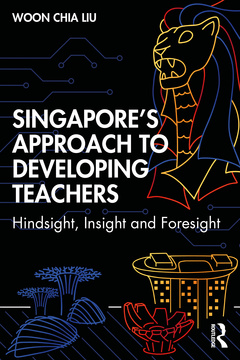Singapore’s Approach to Developing Teachers Hindsight, Insight, and Foresight
Auteur : Liu Woon Chia

Singapore?s education system has come to international attention due to its commendable performance on the Worldwide Educating for the Future Index produced by The Economist Intelligence Unit (EIU), as well as the students? continual sterling performance in internationally benchmarked tests such as Trends in International Math and Science Survey (TIMSS), and Programme for International Student Assessment (PISA). The accomplishments are the result of a long-haul vision of education, and more importantly, a deep commitment towards developing teachers for the 21st century. Singapore has invested steadfastly from the early years in teachers at the front line of the classrooms in schools. This book explicates the ?thinking? behind Singapore?s approach to developing teachers and building the teaching profession. It examines how Singapore strives to attract the best and the brightest people to become teachers, develop them into autonomous professionals, and grow them over their career so that they are able to deliver quality education for every child. The author hopes that by sharing the hindsight, insight and foresight of the system, and looking at Singapore's aspirations and challenges, the book can stimulate reflection and generate discussion, and provide ideas for improving teaching and teacher learning worldwide.
Part I The teaching profession 1. A national priority and a profession 2. Teacher status and symbol 3. Learning as part of the DNA 4. Optimise strengths and support growth5.The Tripartite partnership Part II Preparing the teachers 6. Rooted in values7.Significance of ownership 8. Clinical practice and teacher personhood 9. Cutting-edge technology and innovative pedagogy 10. Multiple perspectives and future-orientation
Woon Chia Liu is the Dean of Teacher Education at the National Institute of Education (NIE), Singapore. She is also an Associate Professor with the Psychology and Child & Human Development Academic Group and a co-founder of the NIE’s Motivation in Educational Research Laboratory. During her Deanship, she led her team to develop and implement the NTU-NIE Teaching Scholars Programme and the 16-month extended Postgraduate Diploma in Education programmes. She co-chaired the committee that developed the NIE Teaching and Learning Framework, and led a team to champion the use of IoT in Education, which eventually culminated in the opening of the IoT@NIE learning lab, a world first in an education institute of higher learning. In addition, she works very closely with schools and the Ministry of Education, Singapore. For example, she was in the Steering Committee and co-chaired the Working Committee for the development of the Singapore Teaching Practice (STP), which articulates Singapore’s vision of learning in the classroom, our beliefs about students as learners, and the teaching practices that support the realisation of this vision. As part of the NIE Senior Leadership team, she represented Singapore and/or NIE on international platforms such as the Southeast Asian Ministers of Education Organization Centre specialising in Higher Education Development (SEAMEO RIHED) Governing Board and the Asian Roundtable of Presidents of Universities of Education.
Prior to her appointment as Dean, she was the Associate Dean, Practicum and School Partnerships (2009–2014). She was instrumental in the conceptualisation of the enhanced practicum model. From 2008 to 2009, she served as a co-chair of the Theory-Practice task force in the NIE’s Programme Review and Enhancement (PRE) initiative, which culminated in the NIE’s Teacher Education Model for the 21st Century (TE21). She is a trained teacher and taught Chemistry and Mathematics at the secondary level bef
Date de parution : 09-2021
15.6x23.4 cm
Date de parution : 09-2021
15.6x23.4 cm
Thème de Singapore’s Approach to Developing Teachers :
Mots-clés :
Pre-service Teachers; Teacher Personhood; Education System; High Performing Education System; TALIS; PISA; Professional Development; TIMMS; Teacher Education Programmes; IoT; PGDE Programme; Internet of Things; Singapore Teachers; Singaporean Model of Teachers; OECD Average; Singapore; Overburden; In-service teachers; Education Key Stakeholders; Singapore's Approach; Autonomous Teachers; Teacher Identity; Master Teachers; Teacher Training; Pre-service Teacher's Comment; Teacher Development; Inquiry Based Learning; Teacher Education; University Based Teacher Education; Teaching Performance Evaluation; February 1b; Theory Practice Nexus; Stanford Teacher Education Program; Leadership Development; Differentiated Instruction; Iterative Calibrations



